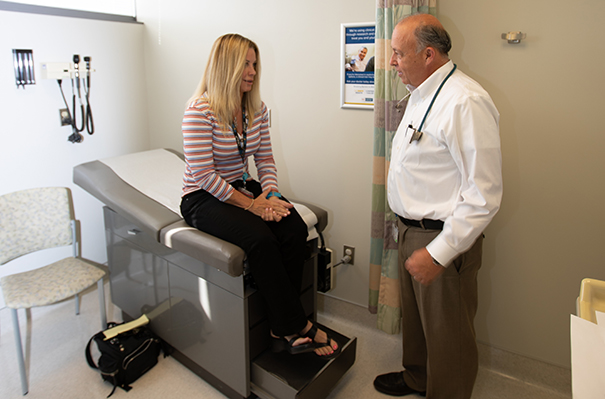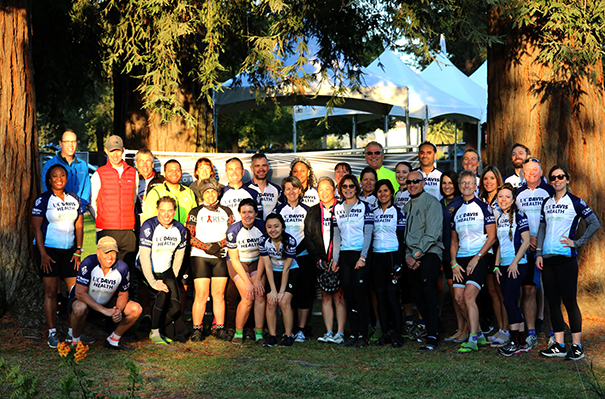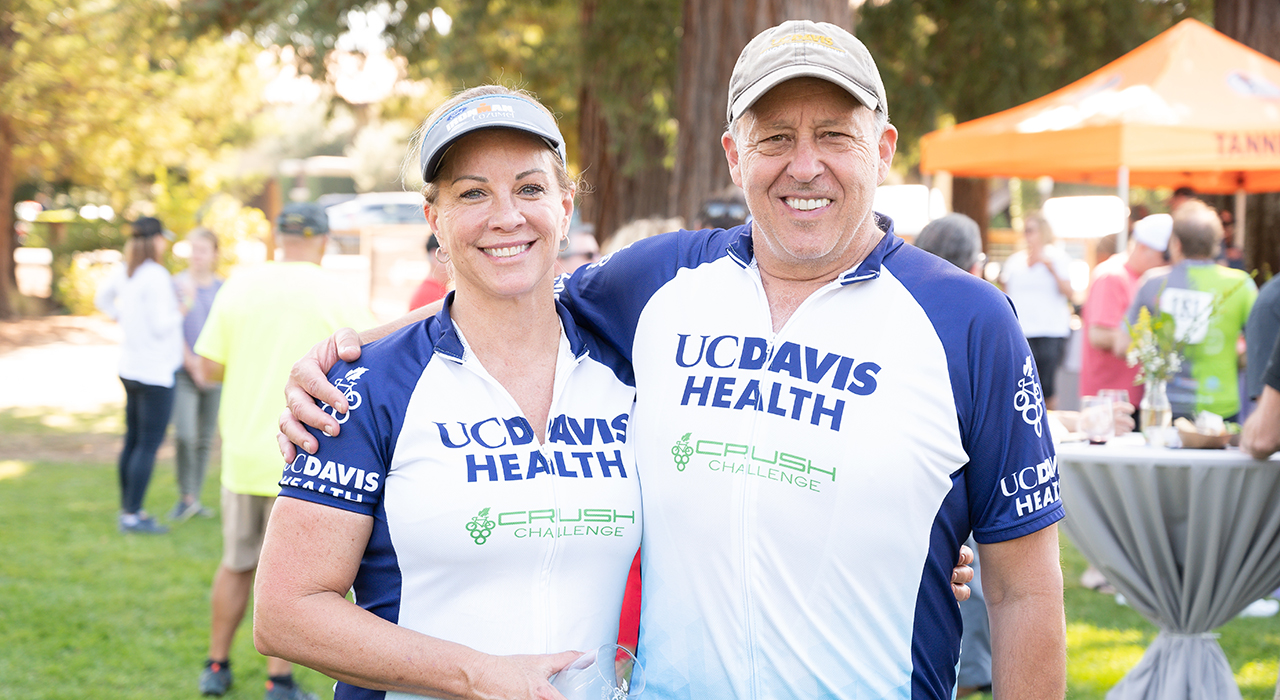Karin Sanders has completed more full distance Ironman triathlons than she can count, plus a pile of 50-mile trail runs and monster 200-mile bike rides, all powered by her own adrenaline and stamina. Today she’s tackling another big physical challenge — chronic lymphocytic leukemia. And this time she has help: oncologist Joe Tuscano, who specializes in blood cancer and cancer research at the UC Davis Comprehensive Cancer Center.
"I'm really new to this cancer thing," said the 54-year-old Sanders. "This is a big deal. I don’t have the endurance I had five years ago. I’m not the same Karin."
But Tuscano, she said, has given her a better understanding of her disease, and she is back to work after surgery and is exercising, albeit at a less competitive level.
"I'm fine," she said. "I will probably need a stem cell transplant down the road, but if I am feeling good, I am good."
On what began as a chilly day in October, Sanders was feeling very good. Wearing a UC Davis Health jersey, she participated in her first Crush Challenge, a cycling, food and wine event in Napa co-presented by UC Davis Health and the cancer center. The Crush Challenge raises money for Tuscano’s research into a non-toxic cure for blood cancer through the deLeuze Family Charitable Foundation. Sanders not only brought in $750 for the cause but she charged through her 50-mile ride, including some long, steep climbs without stops, in just over three hours.
"I'm a pretty aggressive rider," she said. "I like to ride hard and fast. If I can, that’s what I’ll do, and that’s what I did."

Sanders was one of about 60 members of the UC Davis Health team, and one of five of Tuscano’s patients who believe in what their doctor is doing and are willing to push themselves up hills for miles on end to prove it.
They included Kevin Kovalesky, who was diagnosed in 2013 with acute lymphocytic leukemia. He was gold mining in Mauretania when he got sick, spent nearly a month in a Canary Islands hospital without an explanation, and finally was diagnosed at UC Davis. Today, he is in full remission after total-body radiation treatments.
"I think anything that is non-toxic and can have a positive effect is ideal," he said of Tuscano’s research. "The side effects of treatment are very hard and create prolonged issues."
One patient’s commitment to find a less toxic cancer treatment
Tuscano’s work on an alternative treatment began in 2004 when he was approached by Norman deLeuze, the Napa vintner who launched the successful ZD Wines company, now run by his children. DeLeuze had mantle cell lymphoma, but did not want the accepted treatment — chemotherapy, which he knew was toxic. While Tuscano didn’t have anything non-toxic to offer, he agreed to take care of deLeuze. The vintner conducted extensive research on alternative approaches and landed on a fermented wheat germ product he found in Europe. He started taking it, and when his tumors began to shrink, Tuscano took notice.
"I said, 'Norman, can you give me some of that stuff?'" he recalled.
Tuscano conducted experiments both in cell culture and in laboratory animals, and they confirmed that the product was active against tumor growth.
DeLeuze lost his battle with lymphoma in 2007, but not before he set up a foundation to fund a full-fledged research effort. This includes numerous laboratory studies, a new patent and plans to bring the findings to patients through a clinical trial.
The Crush Challenge is one of the ways in which the deLeuze family and ZD Wines have kept the funds for Tuscano's work flowing. They understand that before the National Institutes of Health or major biotech companies will invest in the kind of work required to get a product to patients, a researcher needs to generate a lot of good data.
"I think we are making enormous progress," said Tuscano. "I think we are close to potentially identifying a new drug that activates the immune system and treats not only lymphoma but other malignancies. While we’ve been successful in terms of generating additional support and creating some really good data, translating that to new treatments for patients is incredibly expensive, so we still have a lot more work to do to get this to patients."
Patients give back by joining Crush Challenge
His patients stand behind his effort.
"I said to myself, 'If I'm fortunate enough to get through this, I'm going to do what I can to support Dr. Tuscano,'" said Loel Heupel, who had Waldenstrom’s macroglobulinemia, a type of lymphoma that eventually required a stem cell transplant.
In addition to riding in the Crush Challenge, Heupel has also raised $200,000 for Tuscano’s work through his annual Sunday on the Green golf tournament.
"As we support him and learn more about his research, we get more inspired," said Heupel. "I feel so good about what he’s done for me."

Joseph Patrick Jacobs was diagnosed 18 years ago with follicular non-Hodgkin lymphoma. A plant geneticist based in Davis, he too researched alternatives to traditional treatment and wound up in Tijuana, Mexico, where he took a tonic he hoped would cure him. It didn’t.
When he later saw Tuscano after having declined the standard of care, Tuscano discovered Jacobs by then had two forms of lymphoma, one slow growing and the other aggressive and relentless. He has since had a stem cell transplant and is going strong in remission for more than seven years. He raised $1,000 for his Crush Challenge ride and has high hopes for what his doctor might accomplish.
"Eighteen years ago it was a shotgun approach (to treatment)," he said. "If you lived through it, great. We are getting more and more precise. The fact that we have a medical doctor who is willing to look at something non-toxic, that’s what we need. That’s the future."
Sanders said her first Crush Challenge was motivating.
"I will definitely do it next year," she said. "I want to raise more money. I’ll try to double it, if not more."
Like the other patients who rode that day, Sanders wants better cancer treatments regardless of the cancer journey she has yet to tackle.
"I'd like to be the old Karin again, but I probably can’t," she said. "If Dr. Tuscano comes up with a non-toxic cure, that is what I am looking for. If I don’t get to see that reality, I hope someone else does."





